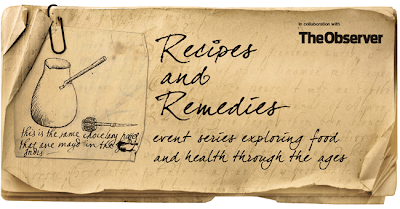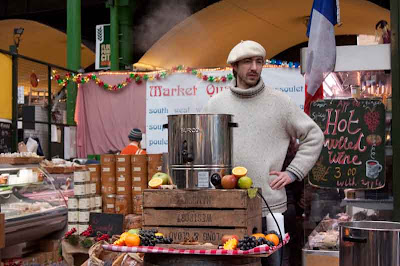
This month’s new cataloguing bulletin from the Archives and Manuscripts department releases a large tranche of material for researchers to work upon: five collections of twentieth-century papers, totalling over 230 archive boxes of material or over 1000 new database records. Our congratulations to the cataloguers! All this material is now not merely catalogued in the online database, but also enabled for online ordering so that researchers can, should they wish, browse the catalogue, click the ordering link and have the material ready to view on Monday.
Although the records’ date is similar – twentieth-century, with a bias towards the latter half - the subjects documented span a wide range, from institutional documentation to personal papers, from hard-core laboratory science to the social implications of health and welfare. The largest and smallest collections are both records of organisations concerned with public health and with communication (in both directions) between citizens and their health-providers.
The records received from the Royal Society for Public Health and its predecessor bodies (
SA/RSP) total well over 100 archive boxes and span the widest date-range of any released this month, going back to the foundation of the Sanitary Institute in 1876. The organisation’s history is complex. The Sanitary Institute amalgamated with the Parkes Museum of Hygiene in 1883 (and opened a School of Hygiene), changing its name in 1955 to the Royal Society for the Promotion of Health (the shorter form Royal Society of Health was also used. The Royal Institute of Public Health was founded in 1886 (simultaneously, the same founders set up the College of State Medicine which merged in 1892 with the laboratory founded by the British Institute for Preventive Medicine and eventually became the Lister Institute: see that organisation’s records held as
SA/LIS). The third major strand in the organisation’s history is that of the Institute of Hygiene, which was founded in 1903, and merged in 1937 with the Royal Institute of Public Health to form the Royal Institute of Public Health and Hygiene. In 2008 the Royal Society for the Promotion of Health merged with the Royal Institute of Public Health and Hygiene to form the Royal Society for Public Health, bringing all these bodies together. The archives document some strands in the history better than others: the main body of records of the Royal Institute of Public Health and Hygiene were held at its headquarters in the 1990s and surveyed by the Wellcome Library’s archivists then, but had gone elsewhere by the time the newly-unified society presented its historic papers to the Library in 2009. When the missing records are located, they will join the archive here. The collection is, however, already a rich source and includes minutes, examination registers relating to the various qualifications awarded by the societies, publications, financial, legal and administrative material, photograph albums and property records and was first described in an
earlier blog posting a few days ago.
A far smaller collection is that of Health Concern (
SA/HCN). This body was founded in the mid 1980s with the primary aims of 'campaigning for more resources, co-ordinating comment on Government plans for the NHS and exchanging information on research.' – it was a broad alliance of various member organisations who shared the aim of supporting the NHS by promoting its basic principles and mounting an educational programme on healthcare and treatment. Although non-party in its remit, it clearly operated at a time when the whole concept of socialised healthcare versus the market was a political hot issue (and indeed was founded by Lord Ennals, who had been a Labour minister under Harold Wilson) so its activities were inescapably political in their context. The papers, dating from the 1980s, document its founding and administration during these crucial years.
Turing to personal papers, the records created by Professor Tim Lang and held as
PP/TLA are also of major importance regarding public health issues. Tim Lang’s work has been in the field of public understanding of the food supply chain and the issues raised by what we eat and how we get it. His archive, totalling seventy boxes, documents his extensive involvement and role in the field of food policy, nutrition, environment and public health from the late 1970s up until 2000, and also provides a significant record of the development of food policy as a topic for discussion, notably in the UK, during this period. Organisations such as the London Food Commission, Parents For Safe Food, the National Food Alliance and the Sustainable Agriculture Food and Environment (SAFE) Alliance are documented, as well as Tim Lang's wide-ranging writings on food; subject files cover some of his interests such as meat production standards, a school meals campaigns in Lancashire (early 1980s) as well as the national school meals campaigns in the 1990s, low income and food poverty, the Food Safety Act 1990, the salmonella and the listeria 'scares' in the late 1980s, and the impact of General Agreement on Tariffs and Trade (GATT) reform and the Common Agricultural Policy (CAP) on the food trade, health and safety, the environment and the developing world.
Finally, two collections relating to laboratory scientists conclude this month’s round-up. The papers of Robert Race and Ruth Sanger relating to their work on blood groups (
PP/SAR, complementing the organisational records held in
SA/BGU) were described in a
separate blog posting earlier today. Like Race and Sanger, Dr Shirley Ratcliffe (
PP/SRA) was involved in work at a Medical Research Council Unit, in this case the Edinburgh Cytogenetics Unit Study of Long Term Outcomes for Children Born with Sex Chromosome Abnormalities which in 1967 embarked on a longitudinal study of children born with these abnormalities, to establish the conditions’ incidence and long-term prognosis. The study – which also looked at a control group of children without these conditions – ran until the mid-1990s, but Dr Ratcliffe’s papers on the subject continued to be generated until 2010, the very year in which they were transferred to the Library. Much of the material, clearly, is made of clinical patient data that for the moment is
closed under the Data Protection Act; however, there is much material on the conditions in general that is available for consultation now, with more to come of course as the years pass.
Image: a man with Klinefelter Syndrome, in which an extra X chromosome is added to the normal male XY pairing; the work of Shirley Ratcliffe looked at children born with this type of chromosomal abnormality, among others. In this picture, taken from Wellcome Images, the subject - who has undergone testosterone replacement therapy to enable development of male secondary sexual characteristics such as development of muscle bulk - is working out to avoid the development of osteoporosis, a common problem in males with his particular Syndrome.
 Friends and I had a superb lunch on the weekend at a wonderful pop-up restaurant in Islington. Cook Philip Dundas's concept of PipsDish is to offer food cooked with love. Imagine you are eating at your grandmothers and the family is all gathered around the table. No arguments and no-one stuck out in the kitchen.
Friends and I had a superb lunch on the weekend at a wonderful pop-up restaurant in Islington. Cook Philip Dundas's concept of PipsDish is to offer food cooked with love. Imagine you are eating at your grandmothers and the family is all gathered around the table. No arguments and no-one stuck out in the kitchen. The food is fresh and mostly locally grown. Fresh fish caught in Cornwall. Rare-breed pigs and beef. They have visited the fields the animals are raised in. If it is not local it will be the best from Europe like their top olive oils from Italy.
The food is fresh and mostly locally grown. Fresh fish caught in Cornwall. Rare-breed pigs and beef. They have visited the fields the animals are raised in. If it is not local it will be the best from Europe like their top olive oils from Italy.  There is no menu no decisions to make it really is just like being at Grandma's. Booking is essential as the food is bought and cooked just for those who have made a reservation. It's also BYO.
There is no menu no decisions to make it really is just like being at Grandma's. Booking is essential as the food is bought and cooked just for those who have made a reservation. It's also BYO.
















